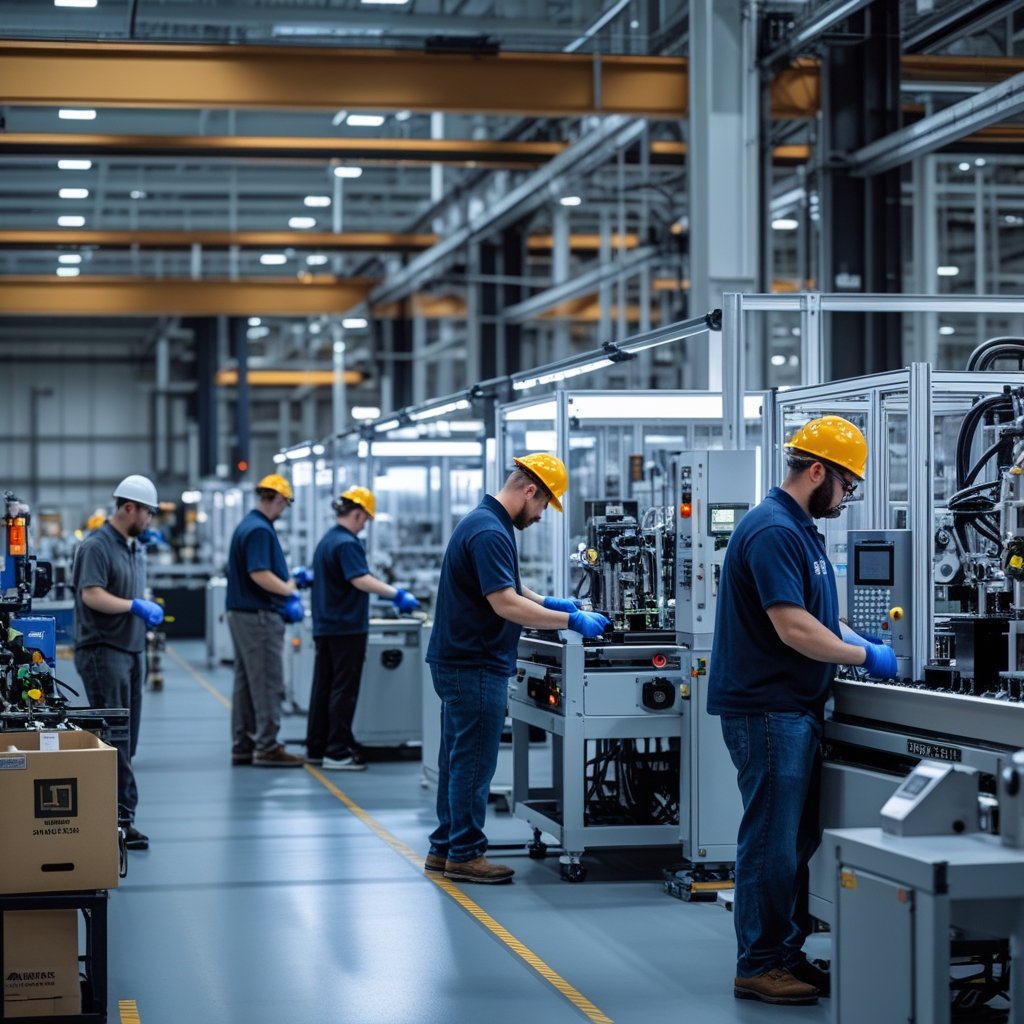If you’re looking for a solid career path, Ohio manufacturing jobs offer a range of opportunities. From entry-level assembler roles to engineering and management positions, there are options to fit different skills and goals.
Ohio’s manufacturing sector is strong and growing. It provides steady work with benefits for many types of workers.
Whether you want hands-on work like CNC machining or roles in design and product development, Ohio companies are hiring. You’ll find jobs in cities like Cleveland, Akron, Canton, and Lancaster, with flexible options like temporary, temp-to-hire, or permanent placements.
We’re here to guide you through your job search. With the right support, you can take the next step in your manufacturing career with confidence.
Overview of Ohio Manufacturing Jobs
Ohio’s manufacturing sector offers many skilled job opportunities for people with different backgrounds. You’ll find work in areas like machine operation, project management, and specialized trades.
These jobs are important to the local economy. They provide a chance to build a steady career.
The sectors below show where many of these jobs come from. Manufacturing plays a big role in Ohio’s economic health.
Key Industries in Ohio
Ohio’s manufacturing industry covers several key areas: automotive, aerospace, machinery, and metal products. You might work as a machinist operating multi-spindle machines or in assembly lines that build parts for vehicles and machines.
The state is also known for producing tools, industrial equipment, and chemicals. Many companies seek workers with a high school diploma or trade skills, making these jobs accessible if you’ve completed technical training or apprenticeships.
You can find roles in factories around Cleveland, Akron, and other cities. Many manufacturers offer benefits, permanent jobs, and temp-to-hire options so you can try out the work before committing long term.
Economic Impact of Manufacturing
Manufacturing is a major part of Ohio’s economy. It supports thousands of jobs in both big cities and small towns.
When you work in manufacturing, you help local families earn steady wages. You also boost other businesses like shipping and retail.
The sector contributes billions of dollars in economic output each year. These jobs often come with health care benefits and chances to advance.
Ohio’s factories attract investments and keep communities strong.
Types of Manufacturing Jobs in Ohio
Manufacturing jobs in Ohio cover a wide range of skills and roles. Whether you are hands-on with machines, working with your trade skills, or focused on engineering, Ohio’s manufacturing industry offers many paths.
Each job type has its own focus and requires different training or experience.
Production and Assembly Roles
If you like working with tools and building things, production and assembly jobs might be a good fit. These roles often involve assembling parts, using hand and power tools, and sometimes working with light industrial machinery.
For example, you could work as a Mechanical Machine Assembler, putting together machines used in manufacturing processes. These jobs usually need a high school diploma or GED, and any electrical skills you have can be a big plus.
Your day-to-day work might include following blueprints, handling parts, and making sure everything fits together as it should. These roles often pay hourly and can offer steady work, especially if you enjoy working on a team and being active on the shop floor.
Skilled Trades Positions
Skilled trades are a crucial part of Ohio’s manufacturing workforce. If you have training or experience in areas like welding, machining, or electrical work, you can find solid job opportunities.
These jobs require hands-on skill and precision. You might maintain machines, fix equipment, or build complex components.
Tradespeople are in high demand because their work keeps the factory running smoothly. Working in skilled trades means you learn valuable skills on the job or through technical schools.
Your work will often be physical, practical, and problem-solving. These jobs can be hourly or salaried, depending on your experience and the company.
Engineering and Technical Careers
If you enjoy designing, planning, and improving products, engineering roles are key in Ohio’s manufacturing sector. You could work as a Mechanical Engineer or Product Development Engineer, helping develop machinery, tires, or other products.
Many engineering jobs require a bachelor’s degree. Once you qualify, you might lead teams, create product designs, or test prototypes.
Companies look for skills in software like SolidWorks and AutoCAD to work on precision assembly and manufacturing processes. These roles often come with longer-term benefits and salary ranges between $65,000 and $145,000.
If you want to grow your career and influence product quality, engineering might be your path.
Top Cities for Manufacturing Employment in Ohio
Ohio has strong manufacturing hubs where many employers look for skilled workers. These cities offer good job options, training programs, and connections to reputable companies.
Knowing where to focus your job search can help you land a position that fits your skills.
Columbus
Columbus is a growing center for manufacturing jobs. The city combines traditional manufacturing with advanced industries like electronics and automotive parts.
You’ll find jobs in assembly, machine operation, and quality control. Many companies here offer training programs to help you gain new skills or move up in your career.
With a good mix of temporary and permanent roles, Columbus gives you flexibility. Commuting and living costs are reasonable compared to bigger cities.
Cleveland
Cleveland has a long history in manufacturing and still leads in heavy industry and metalwork. If you have skills in welding, machining, or equipment maintenance, you’ll find solid opportunities here.
The city supports manufacturing growth through local training centers and community programs. Employers often seek workers ready to take temp-to-hire roles, so you can try the job before committing.
Cleveland’s focus on long-term success means you’re likely to find meaningful, stable work.
Cincinnati
Cincinnati offers a mix of manufacturing jobs mainly in food processing, plastics, and machinery. The city’s manufacturing employers value dependable workers who are open to both temporary and permanent jobs.
You can also find roles in entry-level and skilled trades here. Cincinnati offers community resources that help with resume building and interview prep.
With affordable and friendly staffing support, you’ll have help every step of the way.
Major Employers in Ohio’s Manufacturing Sector
Ohio’s manufacturing scene includes some of the biggest names in both the automotive and aerospace industries. These companies offer a range of job opportunities, from entry-level to skilled positions.
Knowing who the major employers are can help you target your job search.
Automotive Companies
Ohio is home to several key players in the automotive industry. Big manufacturers like Honda, General Motors, and Ford have large plants here.
These companies produce cars, trucks, and automotive parts. Many jobs focus on assembly, quality control, and maintenance.
Working for these companies can offer steady work with benefits. You’ll find roles in welding, machining, and production support.
Many automotive employers provide training programs to help you grow your skills. The work pace is often fast but rewarding, especially if you like hands-on tasks.
Aerospace and Aviation Manufacturers
Ohio also plays an important role in aerospace and aviation. Companies such as GE Aviation and Safran are major employers in this sector.
They design and build jet engines, aircraft parts, and other high-tech components. Jobs in aerospace often require more technical skills or certifications.
Many roles focus on precision, quality, and advanced manufacturing processes. If you’re interested in engineering support or specialized assembly, this field could be a good fit.
Aerospace work has a strong focus on safety and innovation.
Job Requirements and Desirable Skills
To qualify for manufacturing jobs in Ohio, you’ll need the right education, certifications, and technical skills. These help you work safely, efficiently, and keep up with technology.
Understanding what employers want gives you a clear path to start or grow your career.
Education and Training
Most Ohio manufacturing jobs require at least a high school diploma or GED. Some roles ask for more specialized training, like community college certificates or apprenticeships.
You might find training programs at local tech schools or through your employer. These programs often focus on skills like machine operation, blueprint reading, or safety protocols.
On-the-job training is common. It helps you get hands-on experience while learning company-specific processes.
Certifications
Certain certifications can make you stand out. For example, OSHA safety certificates show you know workplace safety rules.
Other helpful credentials include forklift operator licenses or CNC machining certificates. These prove you have the specific skills employers want.
Certifications often require ongoing renewal. Keeping up-to-date shows you’re committed to safety and quality work.
Technical Skills
Manufacturing jobs usually need you to work with machines, tools, or software. Skills like reading technical drawings, using hand tools, and operating machinery are key.
Basic math and problem-solving skills help with measuring parts and fixing issues on the line. You should also be good at following instructions and working as part of a team.
Familiarity with computer systems or automation is a plus. Many plants use digital controls and software for daily operations.
Current Trends in Ohio Manufacturing
Ohio’s manufacturing world is changing with new growth areas and smart technology. You’ll find more jobs in certain sectors, while machines and technology help workers do their jobs better and faster.
Growth Sectors
In Ohio, automotive parts and tool manufacturing are steady job creators. The state also sees growth in tire product development for cars and light trucks.
These areas focus on making products used in new vehicles and repairs. Job openings often include roles like mechanical engineers, who solve design and cost issues, and CNC machine technicians, who keep machines working smoothly.
If you want a career here, look for companies that work with vehicle parts or advanced tools. These sectors offer chances to learn and grow in your role, especially if you like hands-on work or engineering.
Automation and Technology
Automation is a big part of Ohio’s manufacturing scene. More companies use machines that handle tasks like cutting, shaping, or assembling parts.
Jobs in machine maintenance and system integration are important. Skilled technicians help keep these machines running and improve production.
You’ll also see more digital tools to track workflows and reduce waste. Learning new tech skills will boost your value as a candidate.
By combining your knowledge with automation, you can work smarter and keep your job in a changing market.
How to Find Manufacturing Jobs in Ohio
Finding manufacturing jobs in Ohio takes a mix of good tools and smart choices. Knowing where to look and how to connect with employers makes the process clearer and faster.
You can explore job listings online. You can also work with staffing agencies or meet employers face-to-face at career fairs.
Online Job Boards
Online job boards make it easy to find manufacturing jobs. Sites like Integrity Jobs list openings for many positions, such as CNC machinists and mechanical engineers.
You can use filters to narrow jobs by location, salary, or type of work. Keep your resume ready and updated, and apply directly through the site.
Some boards offer tips for resumes and interviews. Checking daily or setting up alerts helps you see new jobs first.
Staffing Agencies
Staffing agencies in Ohio work closely with manufacturing companies to fill jobs quickly. When you sign up with an agency like Integrity Jobs, you get help matching your skills with jobs that fit your goals.
Agencies offer permanent, temp-to-hire, and temporary roles. They can give advice on polishing your resume and prepping for interviews.
You also get support during your job search, which makes the process less stressful. Agencies can connect you with jobs that may not be listed publicly.
Career Fairs
Career fairs are events where employers from Ohio’s manufacturing sector meet job seekers face-to-face. Attending a fair gives you a chance to speak directly with hiring managers.
You can ask questions, hand out your resume, and make a good impression. Look for fairs advertised by local colleges, workforce development centers, or staffing firms.
Come prepared with copies of your resume and dress professionally. Career fairs can lead to quick interviews or even on-the-spot job offers.
Salary Expectations and Benefits
When you start a manufacturing job in Ohio, it helps to know what to expect in pay and perks. Wages vary by role, but many positions offer steady pay with added benefits.
Average Wages for Key Roles
In Ohio manufacturing, pay depends on your job and experience. For example:
| Job Title | Average Hourly Wage |
| Assembler | $15 – $18 |
| CNC Machinist | $18 – $23 |
| Machine Operator | $16 – $20 |
| Quality Control Inspector | $17 – $21 |
| Maintenance Technician | $20 – $26 |
Entry-level jobs often start closer to $15 per hour. Skilled roles like CNC machinists or technicians pay more as you gain experience.
You can expect regular raises or bonuses based on your performance and the company’s growth.
Benefits and Perks
Many manufacturing jobs offer benefits beyond your hourly wage. You might get health, dental, and vision insurance.
Paid time off and holiday pay are also common. Retirement plans like 401(k) with company match may be available.
Some employers offer training programs to build your skills. Flexible work schedules are possible in some cases.
These benefits vary by employer. If health coverage or retirement savings matter to you, check the details before applying.
Advancement Opportunities in Ohio Manufacturing
You can grow your skills and take on more responsibility in Ohio’s manufacturing sector. Many companies offer programs to help you build your career.
Career Progression Paths
You often start in entry-level roles like machine operator or assembler. From there, you can move into specialized jobs such as technician, quality control, or production supervisor.
Many companies offer step-by-step moves, like:
- Operator → Technician → Lead Operator
- Assembler → Quality Inspector → Supervisor
- Maintenance Assistant → Maintenance Technician → Manager
Gaining certifications or technical training helps you move faster. You can build on hands-on work and classroom learning to open doors.
Show your commitment by asking for more responsibility and learning new skills on the job.
Leadership Development Programs
Many Ohio manufacturing employers offer leadership programs to prepare you for management roles. These programs teach skills like communication, team management, and problem-solving.
You may join these programs after showing strong work performance and interest in leading others. They often include workshops, mentoring, and special projects.
Key benefits include learning how to handle team challenges and building confidence in decision-making. You also get noticed by company leaders.
Ask your employer or staffing partner about leadership program options.
Workplace Safety and Employee Support
Your safety and well-being at work are important. Ohio manufacturing employers follow strict rules to keep the workplace safe.
They also offer programs to help you stay healthy and get support when needed.
Health and Safety Regulations
Ohio follows safety laws that protect you on the job. These include rules about wearing safety gear, keeping machines in good condition, and proper training before you start new tasks.
Employers must follow the Ohio Bureau of Workers’ Compensation standards and federal OSHA rules. You should expect clear instructions, safety meetings, and hands-on training.
Reporting hazards or unsafe conditions is your right and helps protect you and others. Regular breaks and clean work areas reduce risks.
Support Programs for Workers
Many manufacturing companies provide more than just safety steps. They offer programs like health benefits, counseling, and job training.
Some employers partner with staffing agencies like Integrity Jobs to connect you with temp-to-hire jobs that let you learn on the job before committing full-time. They may also offer employee assistance programs (EAPs) for personal support.
Having a support network at work can make a big difference in your career and day-to-day life.
Future Outlook for Ohio Manufacturing Jobs
Manufacturing jobs in Ohio are expected to keep growing and changing with new technology. You can expect new roles and skills to become important as companies update their operations.
Projected Job Growth
Ohio’s manufacturing sector is expected to grow steadily over the next several years. Jobs in areas like mechanical assembly, engineering, and production management will stay in demand.
For example:
- Mechanical Machine Assemblers are needed to build and maintain equipment.
- Engineering Managers lead teams that design and improve products.
- Entry-level and experienced roles will be available with pay varying by skill and experience.
Growth comes from Ohio’s strong base of industrial firms, especially near Cleveland and Akron. You’ll find jobs that offer permanent and temp-to-hire options.
Emerging Technologies
New technology is changing how manufacturing work gets done in Ohio. You might work with automation, robotics, or advanced design software like SolidWorks and AutoCAD.
These tools make production faster and more precise. You’ll need to learn new skills to keep up.
Some key tech trends include use of automation for repetitive tasks and integration of software for design and manufacturing control. There is a growing demand for workers who can combine mechanical know-how with tech skills.
If you keep your skills updated, you’ll stand out as manufacturing grows more high-tech. Integrity Jobs can help you find training opportunities for these changes.
Frequently Asked Questions
Manufacturing jobs in Ohio need specific skills and training. You can start your career through various programs, and there are chances to grow in the field.
What skills are most in demand for manufacturing positions in Ohio?
You’ll need skills like machine operation, quality control, and safety awareness. Basic math and problem-solving skills are also important.
Being able to work well with others helps too.
How does one get started in a manufacturing career in Ohio?
Start by finding entry-level jobs or internships. Many people begin with temporary or temp-to-hire roles to get experience.
You should also prepare a clear resume that highlights any hands-on work you’ve done.
Can you recommend any vocational training or apprenticeship programs in Ohio for manufacturing roles?
Look for local community colleges or trade schools offering courses in machining, welding, or assembly. Ohio also has apprenticeship programs that combine training and paid work.
What are the growth opportunities in the manufacturing industry in Ohio?
You can move up to roles like technician, supervisor, or quality inspector. With more training, you might advance into machine programming or production management.
Many companies promote from within.
Are there any incentives for veterans looking for manufacturing jobs in Ohio?
Yes, some firms and programs give hiring priority to veterans. There are also training programs to help veterans transition into manufacturing careers with skills recognition and support.
How has the manufacturing job landscape in Ohio changed due to technology advancements?
Automation and robotics are now common in Ohio manufacturing. Many jobs now require tech skills to operate and maintain machines.
Workers need ongoing training to stay current in the industry.




